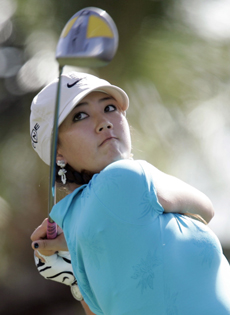Michelle Wie:Just a face in the crowd
(Agencies)Updated: 2007-01-12 09:04
The only crowd watching Michelle Wie was the people she brought with her.
When she first played the Sony Open in 2004 as a 14-year-old, U.S. PGA Tour players alongside her on the practice range would stop what they were doing to watch her hit balls, especially the driver. She turned heads walking across the putting green at Waialae Country Club because the gallery moved with her, along with a horde of photographers.
That wasn't the case on Wednesday.
 Michelle Wie tees off on the 11th hole during the first round of the Sony Open golf tournament in Honolulu, Hawaii, January 11, 2007. [Reuters]  |
Thursday will be her fourth straight time playing in the Sony Open. What had been a buzz is now barely a murmur.
Wie still stands out because of her earrings, nail polish and the braided pigtails coming out of her newsboy hat.
Otherwise, she is starting to blend in.
"No one really talks about it," player Dean Wilson said. "You know she's going to play. We've all seen her play. We've all seen her on TV. She's so popular that there's not much curiosity. You just cheer for her to make the cut."
There is plenty of evidence to support that.
No more than 15 people followed Wie during a practice round on Tuesday when she played with defending champion David Toms. During a 25-minute interview with Davis Love III on Wednesday, no one brought up Wie once.
"It's not a one-shot deal like it was with Annika," Love later said, referring to Sorenstam playing the Colonial in 2003. "We all know her now. I went up and said hello to her like she was another player."
About the only thing that might change that is if Wie can deliver a new result.
She has missed the cut three previous times at Waialae, where she has an honorary membership. She has made the cut only once in 12 attempts against the men, the exception coming last spring at the SK Telecom Open in South Korea on the Asian Tour.
And based on her last four events against the men, there is little indication that this year at Waialae will be any different. Wie withdrew from the John Deere with heat exhaustion, taken away in a stretcher. She finished dead last at the European Masters and 84 Lumber Classic. And at the Casio World Open in Japan, the only player she beat was an amateur.
"I feel like the last couple of tournaments, I don't think I played to my full potential," Wie said. "This week, I want to play the best I can, hit every shot the best I can and try real hard. Whatever happens, happens. I want to play some good golf and make the cut."
She has plenty of fans on tour, and just as many skeptics.
"I pull for her all the time," Ryder Cup captain Paul Azinger said.
Stuart Appleby says Wie continues to bring exposure to the Sony Open, but he's not sure when it will end, referring to it as a "saga."
"I think she came five years too early to play the men's tour," he said. "She should really just let it go for now, come back when she's accomplished at a game that's more comparable to someone like Annika. She's certainly not proving anything except that she can't play with the men at her level right now. There's no doubt she's going to improve dramatically as a player and mature as a person.
"But right now," he added, "it's just the wrong time."
Wie has been dealing with criticism over the last three years, especially with a barren trophy case. She cashed her first paycheck at a U.S. PGA Tour event on Tuesday by winning a pro-junior shootout, paired with a junior golfer who goes to her school. She won the playoff over Wilson, closest to the pin from 100 yards out.
First place was $3,000 (euro2,300).
When someone suggested that playing against the men was about marketing, Wie fired back.
"I guess being the only girl on the baseball team when I was 4-years-old was also a marketing plan - not," she said. "It's what I want to do. Some people take it as, 'It's a marketing plan to make more money, blah, blah. But they don't realize it's what I want to do and I enjoy it. You can't trade happiness for anything."
Meanwhile, her future remains unclear.
The highlight of 2006 was finding out last month she had been accepted to Stanford University. She plans to enroll in the autumn and doesn't expect to stop until she has a diploma, no matter how long it takes.
"I worked my butt off for four years in high school," she said. "I'm not going to just get into Stanford and not graduate."
|
||
|
||
|
|